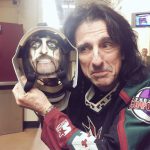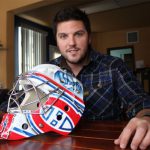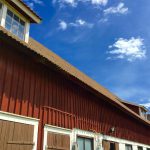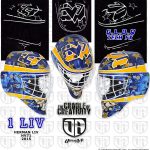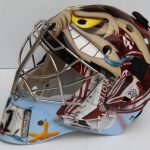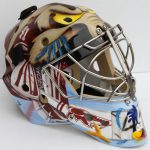- Slug: Sports-Goalie Masks,950
- Photos included (Thumbnail, captions below)
BY MADALYN HEIMANN
Cronkite News
GLENDALE – Every hockey goaltender must wear a protective mask, but the masks often do more than protect the goalie from slap shots flying toward the net at more than 100 mph.
Today’s masks, with their elaborate artwork, can also tell a story about the people behind them.
David Arrigo, David Gunnarsson and Diel Leroux are artists who have told many of those stories, designing and painting masks for many of the game’s best goalies.
Arrigo is responsible for some of the most famous NHL masks and got his artistic start crafting murals on walls for bars and restaurants more than 25 years ago.
Now, he creates much of his art on masks for goalies such as Mike Smith of the Arizona Coyotes. Arrigo said some of his favorite works have been for Smith. The two have collaborated on designs for almost a decade, and their partnership continues to flourish as Smith enters his sixth season with the Coyotes.
“My dad was actually the first one to meet David,” Smith said. “And (Arrigo) never painted a goalie helmet before my first one in Dallas. He is unreal.”
Arrigo, whose studio is located in Hockley Valley near Toronto, Canada, starts his designs by consulting with the athlete to discuss what the goalie has in mind for his mask.
“Depending on the goalie, creative input will vary,” Arrigo said. “Some goalies will just throw some quick ideas and step back. I will normally create a rough sketch based upon the ideas brought by the goalie with some input myself.”
Smith is much more involved than most goaltenders. He goes over every detail of the mask with Arrigo, and their final designs come after many discussions.
“He is obviously the artist, but I have a lot of say in what goes on,” Smith said, “and I think we bump ideas back and forth very well. The end product is always awesome.”
Arrigo and Smith have an unusual working relationship, but one that has produced some beautiful masks.
“I definitely enjoy always working with Smitty,” Arrigo said. “Smitty is very much involved in the process. At some points, he might as well paint it himself.”
But Smith said he isn’t ready to pick up an airbrush himself.
“I am not an artist,” he said. “He’s the artist. I am definitely not a painter, but him saying that means a lot to me.”
Arrigo will send photos to the athletes, keeping them abreast of the progress he’s making on their masks. The length of the process depends on how detailed the design is on a particular mask.
“With NHL players, they need them yesterday,” Arrigo said. “So I like to get them done and out the door within two weeks.”
Arrigo has painted hundreds of masks for goalies in every stretch of their careers. Each one is unique, with the cost of a mask beginning at $650 and going up from there.
Arrigo took a more traditional route to designing and painting hockey masks than Gunnarsson of DaveArt.
“My studio is in the middle of a deep forest on the countryside,” Gunnarsson said. “It is in an old barn built in the 1930s by my grandfather. It is in a small village, kind of like ‘Little House on the Prairie.’”
Gunnarsson’s 20-year career in designing and painting masks evolved in that barn studio in Norra Ljunga, Sweden.
“I started to paint locally,” he said. “And then it started to spread, goalies talking to each other.”
Much like Arrigo, Gunnarsson said that the goaltender he is working with will usually give him a rough idea, and they collaborate on the design.
“The brainstorming process is the most important, to always try to think outside the box and always come up with new ideas,” he said.
Once artist and player agree on a design, Gunnarsson paints the mask.
Among the goaltenders Gunnarsson has worked with are Coyotes backup goalie Louis Domingue, former Coyotes goalie Anders Lindback and New York Rangers veteran Henrik Lundqvist.
One of Gunnarsson’s favorite masks is one he designed for Herman Liv, the son of Swedish-born goaltender Stefan Liv.
“Stefan died five years ago in a plane crash when he played in the (Kontinental Hockey League in Russia),” he said. “Stefan was a good friend of mine, and it was very special to paint for his son. He wanted a portrait of his father on his mask.”
Each mask is different, and the prices vary. Gunnarsson estimates he has designed thousands of masks and he works with about half the goalies in the NHL and AHL, along with goaltenders for national teams and semi-professional leagues.
While David Arrigo got his start painting murals and David Gunnarsson found his passion on a farm, David “Diel” Leroux’s journey to [CUT the] designing goalie masks started when he was dreaming about actually playing hockey.
“During childhood, I was either drawing or playing hockey,” Leroux said. “You could always see me with a hockey stick or a pencil, sketching around.”
While playing amateur hockey, teammates who knew about Leroux’s artistic abilities would ask him to create designs for their masks. When he was injured while playing for the Shawinigan Cataractes of the Quebec Major Junior Hockey League, Leroux rethought his career options.
He turned to art, opening a design studio outside of Montreal, Canada.
“A serious ankle injury made me think about my future as a hockey player,” he said. “At that point, Diel Airbrush came to life.”
Leroux’s passion for the sport can be seen in his designs, including those he has done for Arizona State’s hockey team. He has created more than 700 masks for goaltenders around the world, with each taking about five days to complete once the design idea is finalized.
The mask designs he enjoys most are those for which he is given the freedom to be creative and run with his ideas. But there are guidelines he must follow, too.
“No guns, no girls, no violence,” he said. “But other than that, we can pretty much do whatever we want. I consider myself lucky to be doing the greatest job in the world.”
